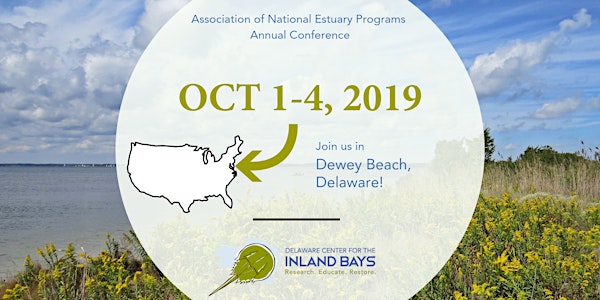
2019 NEP Fall Technical Transfer Meeting
Date and time
Location
Hyatt Place Dewey Beach
1301 Coastal Highway Dewey Beach, DE 19971Refund Policy
Description
Fall Tech Transfer, October 1-4, 2019
Join us in beautiful Dewey Beach, DE for the annual Fall NEP Technical Transfer Meeting! Hyatt Place, just steps from the Rehoboth Bay and the Atlantic Ocean, will serve as both your conference venue and overnight accommodations. Kickoff the week with a bonfire and BBQ on the beach Tuesday evening. While you're here plan on waking up early for special offerings like surfing lessons and guided bird walks. Throughout the week soak up knowledge through guest speakers and tech transfer sessions, take part in communication and education workshops, meet other NEP staff through networking opportunities, and participate in unique field trips like "The Life of a Shuck" where you will travel the life cycle of an Inland Bays Oyster from spat, to appetizer, to use in a restoration project. Event registration includes full conference (October 1-4), 1 field trip, 1 dinner, 2 lunches, and multiple gourmet snack breaks! (Note: Hot Skillet breakfast is included in Hyatt hotel reservations, hotel reservations not included in meeting registration)
Tech Transfer registration and rooms reservations end by September 6, 2019
The Center has set up a website that will be a one-stop shop with all the information you need to plan for the tech transfer. Please check the website out periodically.
To access the website, follow this link: http://www.inlandbays.org/anep-conference-2019/ and enter the password: ANEP2019
Field Trip Descriptions:
The Life of a Shuck- Shellfish Restoration
Explore the life of an oyster shuck in the Center’s Don’t Chuck Your Shucks shell recycling program. Begin by sampling some oysters during lunch at one of our Don’t Chuck Your Shucks partner restaurants, and learn how restaurant staff play a key role in the outreach for this project. Next, you’ll travel to the shell pile to take part in a shell bagging with the “Oyster Master”, and learn how the Center incorporates volunteer groups to create shell bags to use in restoration programs. Then head out on the bay by kayak to see where recycled shells provide habitat for aquatic species- including other oysters! (limit- 25 registrants)
“Waders- on”- Education and Citizen Science at the James Farm
Travel to the James Farm Ecological Preserve to enjoy lunch while learning about the history of this 150-acre site and the vision for future growth. Then tap into your inner child and take part in an interactive student lesson that’s used in the Center’s middle school programming. You’ll end up along a white sandy beach to discover why horseshoe crab-loving citizen scientists can be found along the beaches around the full and new moon cycles every spring. Finally, experience the Preserve as more than 10,000 people do every year- as a visitor exploring the trails or by kayak or SUP on the shallow bay. You might even see a rare patch of Eelgrass!
Swamp Stories - Ecological Restoration at the Great Cypress Swamp
Travel to the Great Cypress Swamp, the largest freshwater wetland and contiguous block of forestland in the State of Delaware and where Bald Cypress knees and the swollen trucks of Black Tupelo rise from tannin-amber water. Eat lunch while being introduced to Delaware Wildlands, an organization dedicated to protecting and restoring Delaware’s important natural areas through the purchase and management of strategic parcels of land. Take a driving tour to discover the extensive hydrological restoration, habitat improvement projects, intensive deer management, and rigorous data collection that has been conducted on site. Observe the swamp beginning to heal marks left by hundreds of year of ditching, draining, extensive timbering and two major historical fires, one of which is believed to have been started by the explosion of a Prohibition-era still.
Upstream Battle- Bishopville Dam Removal & Fish Passage and Lizard Hill Wetland Restoration
Head south with staff from the Maryland Coastal Bays Program to visit two restoration sites off of the St. Martin’s River: a fish passage at the now removed Bishopville dam and wetland restoration at an old sand mine. Learn about the process of removing the 53-year old dam and how that paired with the installation of a fish passage allows for 7 miles of river to be open once more to freshwater spawning fishes. Then, explore the Lizard Hill project site where acres of Atlantic White Cedar have been re-established - a historic coastal habitat which has been nearly non-existent in Maryland. Along the way, we will stop at one of CIB’s projects in Bethany Beach where the CIB is partnering with a local HOA, the State Highway Administration, and others to address stormwater issues.
Outreach/ Education Full Day Session Description:
BEETLES (Better Environmental Education, Teaching, Learning & Expertise Sharing) Training
Led by Amy Barra of CIB and Liz Wist of MCBP, this full-day professional learning workshop is intended for education/outreach professionals and will share techniques for how to better engage audiences with estuary science in an outdoor setting. Education staff who provide programs or presentations about specific project sites can benefit from the BEETLES techniques. BEETLES was developed at the Lawrence Hall of Science at the University of California at Berkeley and funded by a National Science Foundation Advancing Informal STEM Learning grant.